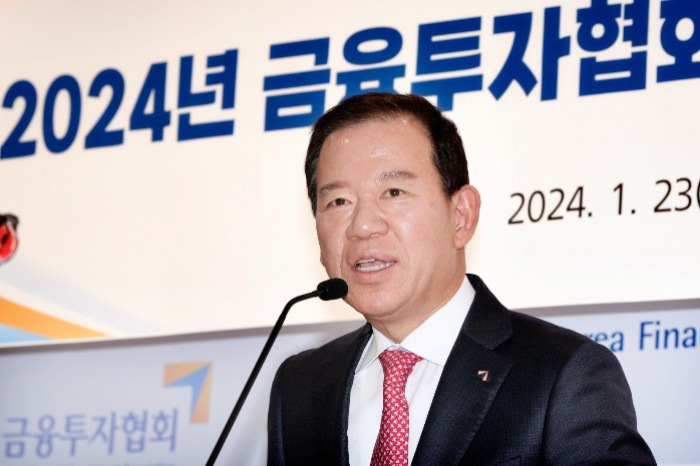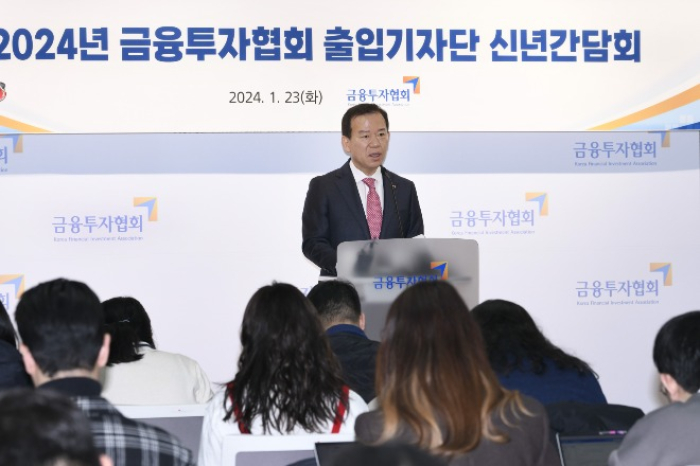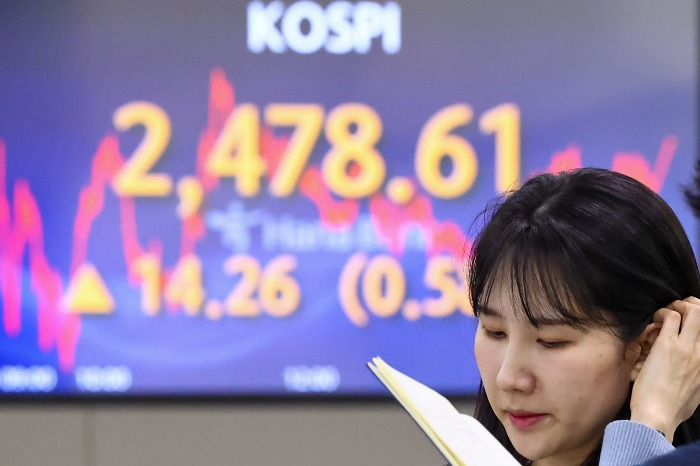Korean stock market
Korea’s ELS market to stagnate after HSCEI debacle: KOFIA chairman
S.Korea’s self-regulatory body for the securities industry will strive to protect the local financial market from an ELS slump
By Jan 23, 2024 (Gmt+09:00)
3
Min read
Most Read
LG Chem to sell water filter business to Glenwood PE for $692 million


KT&G eyes overseas M&A after rejecting activist fund's offer


Kyobo Life poised to buy Japan’s SBI Group-owned savings bank


StockX in merger talks with Naver’s online reseller Kream


Meritz backs half of ex-manager’s $210 mn hedge fund



The Korea Financial Investment Association (KOFIA) will go all out to minimize any adverse effects on the South Korean financial market from an anticipated slump in equity-linked securities (ELS) investment following the downward spiral of Chinese stocks, said the chief of the country’s non-profit, self-regulatory securities organization.
“About 16 trillion won ($12 billion) worth of ELS contracts (tied to the HSCEI) are due to mature this year, and most of them are unlikely to be rolled over after they are redeemed,” KOFIA Chairman Seo Yoo-seok said during a press conference held on Tuesday to commemorate the first anniversary of his chairmanship.
“It is inevitable that the (Korean) ELS market will slump.”
His comment comes after multiple news reports that Korean investors who poured their money into HSCEI-tied ELS products three years ago lost about 230 billion won in total upon their maturities in the first three weeks of this year following the HSCEI debacle.
Considering that many Korean investment firms and financial institutions heavily rely on ELS for their funding and revenue sources, the KOFIA will seek to find solutions for a gradual and painless slowdown in the hybrid fixed-income financial instrument market, Seo said.
PREPARE FOR SPOT BITCOIN ETF TRADING
The KOFIA will also prepare for the opening of the spot bitcoin exchange-traded fund (ETF) market in Korea, according to the organization chief.

The Korean financial regulator currently bans the trading of spot bitcoin ETFs in Asia’s fourth-largest economy despite their approval in the US.
The Financial Services Commission (FSC) earlier this month warned that Korean securities firms’ brokerage services for foreign country-listed spot bitcoin ETFs for their local clients could violate Korea’s Capital Markets Act, which does not classify cryptocurrencies like bitcoin as a legitimate underlying asset for ETFs.
“It is impossible to list spot bitcoin ETFs on the Korean market or broker offshore products now,” said Seo. “But the time would come to amend the related law if demand for spot bitcoin ETFs grows.”
Citing active discussion about cryptocurrency regulations across the world, the KOFIA will strive to be ready to give prompt support for spot bitcoin ETF trading when the time is ripe, added Seo.
MEASURES TO TACKLE THE KOREA DISCOUNT
The KOFIA will also come up with measures to encourage listed companies to improve their dividend payout ratios and to buy back and cancel treasury shares as part of efforts to ease the so-called Korea discount in the local stock market, Seo said.
His comment comes after Korean President Yoon Suk Yeol vowed earlier this month to revitalize the lackluster local financial market by removing all unnecessary regulations on it. Yoon also announced a plan to abolish capital gains taxes.

The KOFIA plans to introduce tax incentives to long-term investment vehicles to bring retail investors back to the domestic financial market.
RISK MANAGEMENT
Seo, however, remained cautious about growing liquidity crunch concerns in the local money market.
He stressed the importance of risk management in the investment industry as he expects interest rates to remain high through this year even after the end of global monetary tightening.
In response to the growing liquidity crunch risk in the country’s money market amid stalled real estate projects, the KOFIA will extend its program to purchase project financing asset-backed commercial papers (PF-ABCPs) until February 2025, Seo said.
The ABCP purchasing program started in late 2022 to mitigate the growing liquidity crunch risk in the local money markets after a missed bond payment by the developer of the Legoland theme park in Korea that year.
The local construction sector grappling with the property market slowdown has been struggling with high financing costs, heightening stress again in the local money market.
This month Korea’s mid-size construction company Taeyoung Engineering & Construction Co. became the first Korean builder to undergo debt restructuring in a decade.
Write to Jihyo Lee at jhlee@hankyung.com
Sookyung Seo edited this article.
More to Read
-
 Korean stock marketKorean investors doomed to suffer $171 mn losses from HSCEI ELS
Korean stock marketKorean investors doomed to suffer $171 mn losses from HSCEI ELSJan 22, 2024 (Gmt+09:00)
3 Min read -
 Corporate restructuringTaeyoung becomes 1st Korean builder in debt workout in decade
Corporate restructuringTaeyoung becomes 1st Korean builder in debt workout in decadeJan 12, 2024 (Gmt+09:00)
2 Min read -
 CryptocurrenciesForeign-listed bitcoin ETF trading suspended in S.Korea
CryptocurrenciesForeign-listed bitcoin ETF trading suspended in S.KoreaJan 12, 2024 (Gmt+09:00)
3 Min read -
 Business & PoliticsSouth Korea set to abolish financial investment gains tax: Yoon
Business & PoliticsSouth Korea set to abolish financial investment gains tax: YoonJan 02, 2024 (Gmt+09:00)
3 Min read -
 Korean stock marketKorea to revise dividend policy to ease ‘Korea discount’ concerns
Korean stock marketKorea to revise dividend policy to ease ‘Korea discount’ concernsNov 24, 2022 (Gmt+09:00)
3 Min read -
 Corporate bondsKorea's $35 bn plan yet to ease Legoland default woes
Corporate bondsKorea's $35 bn plan yet to ease Legoland default woesOct 25, 2022 (Gmt+09:00)
4 Min read
Comment 0
LOG IN


